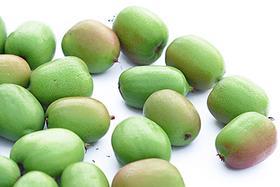
Chinese berry specialist InnoFresh launched a sales campaign for its first trial volumes of kiwiberry production on Monday 20 July.
The launch took place at an official ceremony in Ya’an, Sichuan Province, to remember the victims of the devastating earthquake and floods that tore through the region on 20 April 2013, and to recognise the initiatives and works undertaken to rebuild infrastructure.
The Chinese central and local governments began a large-scale investment programme in the immediate aftermath of the earthquake and flooding on 20 July in order to rebuild infrastructure, local communities and local businesses.
Ya’an, a small town home to around 300,000 people with around 1.5m in the surrounding rural areas, is well-known for tourism and agriculture.
Next to tea, kiwifruit forms a core part of Ya’an’s agricultural production, and in 2012, InnoFresh undertook an initiative to establish trial production of kiwiberries as a new crop in the region.
The company’s trial orchard was planted in February 2013 with plants imported from Europe.
Willem Kokkeel, vice-president of InnoFresh, said that while small volumes of kiwiberries have been imported to China from Chile and New Zealand, they have never been produced on a commercial scale in China before.
InnoFresh has now established almost 30ha of plantings, and it plans to expand production into other areas to lengthen the season, according to Kokkeel. The first commercial harvest is not expected until June 2018, but InnoFresh chose to stage a product launch for kiwiberries at the event. The company is gearing up to harvest the first production from its 2ha trial farm in August, which will be sold online via e-commerce giant Tabao.com.
Kokkeel is convinced that kiwiberries will be a hit with Chinese consumers, noting they are small, ready-to-eat and very healthy and nutritious.
“We are producing the kiwiberries in Ya’an for the local Chinese market initially,” said Kokkeel, one of the founders of InnoFresh. “We have started production with several varieties and our ambition is to build a new product category for kiwiberries in China and later in other Asian countries.”
Innofresh is operating two farms in China, and it plans to open a packing and storage facility later this year in Ya’an.
Filip Debersaques, the head of Ghent University’s kiwiberry project, has advised Innofresh on its initiative from the outset, and he sees good commercial prospects for the venture.
“The local climate is almost ideal for growing kiwiberries. This, combined with the well-trained and highly motivated Innofresh staff, makes me optimistic for successful production over time,” said Debersaques. “Also, there’s a potential market of 14m consumers located less than two hours drive from the farms in Chengdu.”
At the ceremony in Ya’an, regional government representative Gou Yiquan commended the InnoFresh initiative for demonstrating the way that new products and innovative agricultural practices can give new hope to a whole region.
Wen Xiangyang, chairman of InnoFresh, said its innovative agricultural and commercial approaches to develop production of kiwiberries as a healthy snackfruit could help to create a prosperous future for the Ya’an region.
InnoFresh will sell all its trial production via online retail platform TaoBao.com. “Using this modern media guarantees us rapid exchange of information with our consumers. We need to build the kiwiberry category from scratch, explaining to consumers the attributes of kiwiberries, and how to eat and store them, and this is the most effective medium through which to do this,” said Jinming Fan, general manager of InnoFresh. “When we have larger volumes, we will use traditional media and sales channels as well.”



